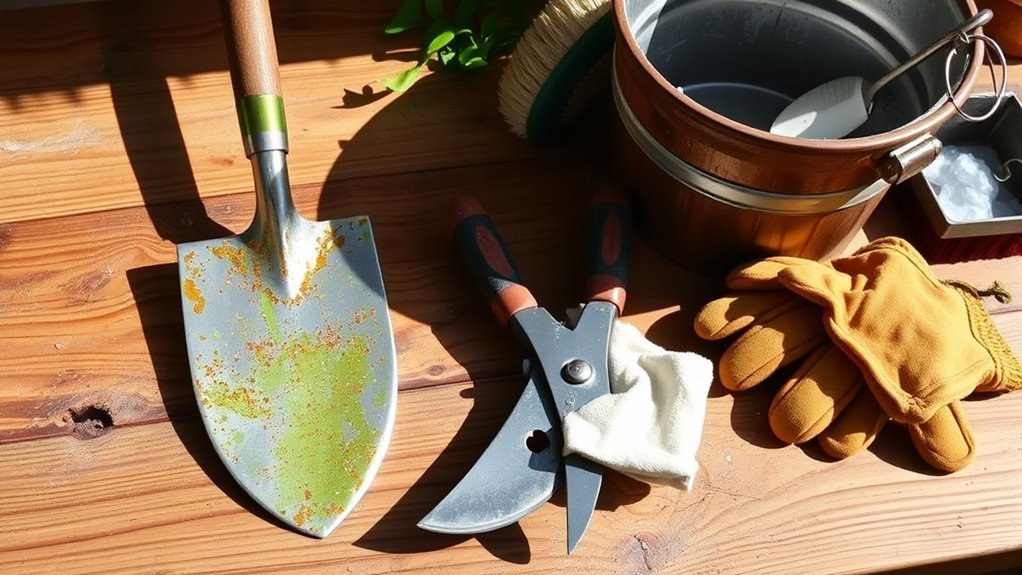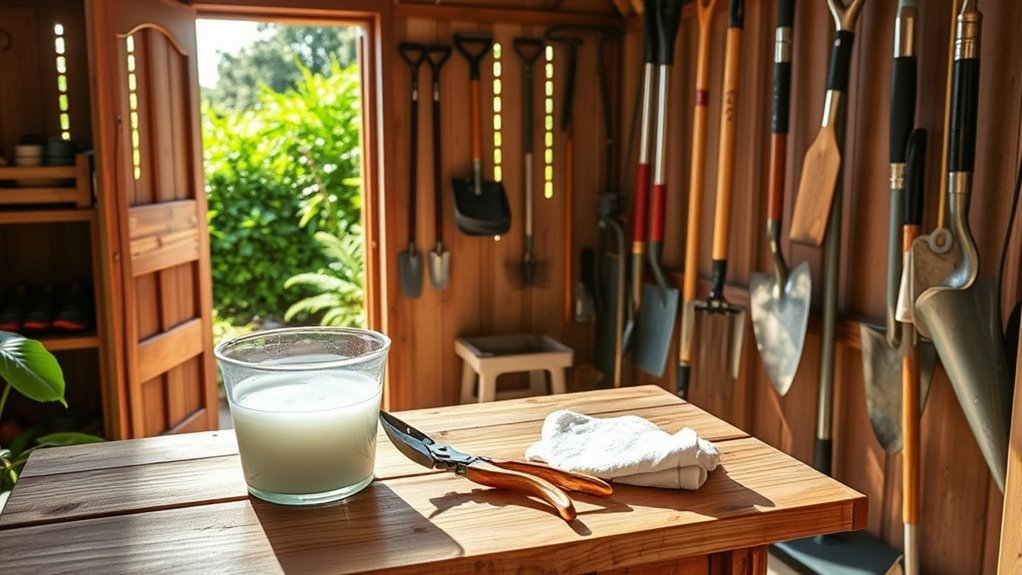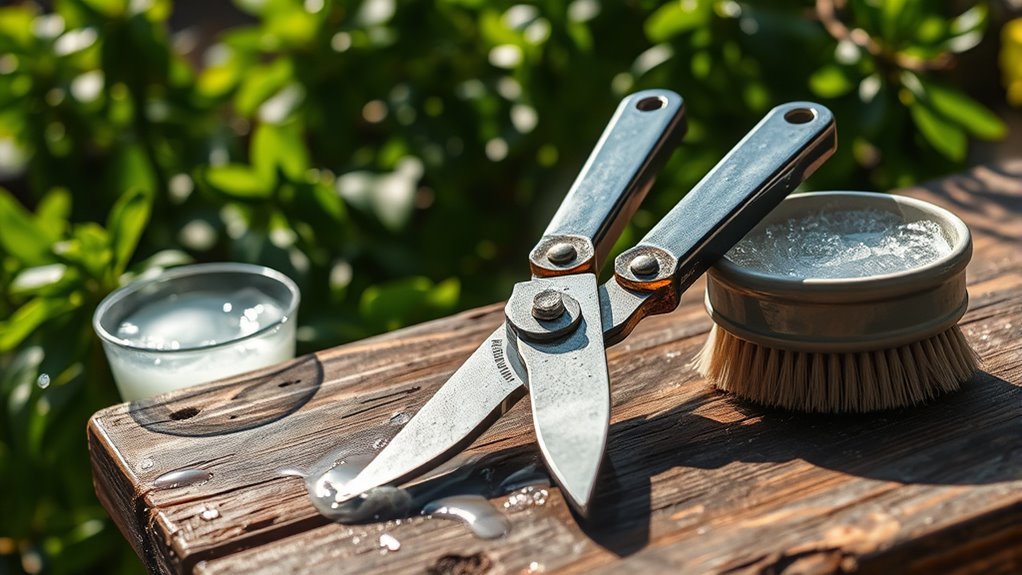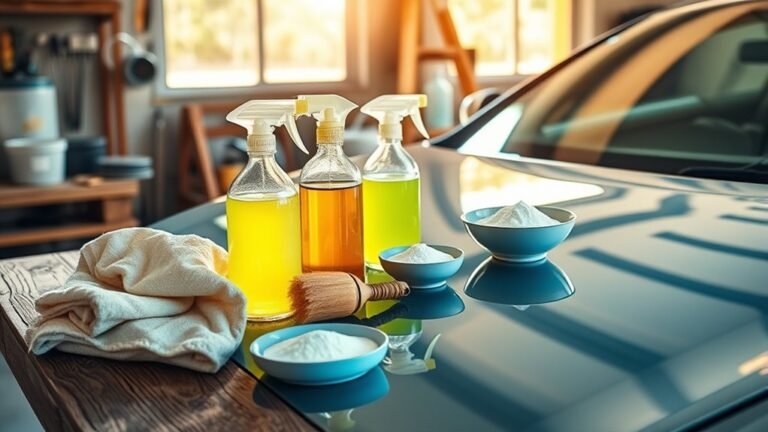How to Clean Garden Tools for Longevity
To keep your garden tools lasting longer, start by brushing off dirt and washing them with warm, soapy water. Dry thoroughly to avoid rust, then apply a light oil coat on metal parts and handles. Use a wire brush or vinegar to tackle rust, and rubbing alcohol or vegetable oil for sap. Sharpen blades regularly and store tools off the ground in a dry, organized space. Following these simple steps guarantees they stay sharp and ready, with more tips ahead to help you maintain their peak performance.
Essential Supplies for Cleaning Garden Tools

To get started with cleaning your garden tools, you’ll need a few essential supplies that make the job easier and more effective. First, gather a sturdy brush or wire brush to remove dirt and rust. Next, have some cleaning solutions on hand—mild soap mixed with water works well for general cleaning, while a diluted bleach solution is great for tool sanitization, especially if you want to prevent spreading plant diseases. You’ll also want a bucket or basin to soak your tools if needed, plus clean rags or towels for drying. Finally, keep some oil or lubricant nearby to protect metal surfaces after cleaning. With these supplies ready, you can maintain your tools’ freedom to work efficiently season after season.
Step-by-Step Cleaning Process
Once you’ve gathered your cleaning supplies, it’s time to tackle your garden tools step by step. Effective tool cleaning guarantees your equipment lasts longer and performs better, giving you more freedom in your gardening. Follow these maintenance tips for a smooth process:
Gather your supplies and clean garden tools step by step for longer-lasting, better-performing equipment and easier gardening.
- Remove dirt and debris: Use a stiff brush or cloth to clear soil and plant residue from blades and handles.
- Wash with soapy water: Dip tools in warm, soapy water and scrub thoroughly to eliminate sticky substances.
- Dry completely: Wipe tools dry with a clean cloth to prevent moisture buildup, which can cause rust.
- Oil moving parts and metal surfaces: Apply a light coat of oil to protect and lubricate, maintaining your tools’ functionality.
Removing Rust and Sap Effectively

Although regular cleaning helps prevent buildup, rust and sap can still accumulate on your garden tools over time. To tackle rust, start by scrubbing the affected areas with steel wool or a wire brush; this not only removes rust but also aids rust prevention by preparing the surface for further care. For stubborn rust, soak tools briefly in a vinegar solution, then rinse and dry thoroughly to stop moisture from causing more damage. When it comes to sap removal, rubbing the sticky spots with a cloth soaked in rubbing alcohol or vegetable oil works wonders. These simple steps help you maintain your tools’ freedom to perform, ensuring they stay in top shape without the hassle of rust or sticky sap holding you back.
Sharpening and Oiling Your Tools
Keep your garden tools in top condition by sharpening their blades and applying oil regularly. This simple routine guarantees they perform efficiently and last longer. Follow these steps for effective sharpening techniques and oiling methods:
- Clean blades thoroughly to remove dirt and sap before sharpening.
- Use a sharpening stone or file, maintaining the original bevel angle for precise edges.
- Apply a light coat of mineral or vegetable oil to metal parts to prevent rust.
- Wipe handles with linseed oil or a suitable lubricant to keep wood from drying out.
Best Practices for Tool Storage and Maintenance

To extend the life of your garden tools, you should store them properly and maintain them regularly. Start by creating a dedicated space for tool organization—hooks, shelves, or pegboards work great. Keeping tools off the ground prevents rust and damage, while easy access frees you to work whenever inspiration strikes. Regular seasonal inspections are key; check for loose handles, rust spots, or dull blades and address these issues promptly. Wipe down tools after each use and apply a light coat of oil to metal parts to fend off corrosion. By committing to these simple storage and upkeep habits, you guarantee your tools stay reliable and ready, giving you the freedom to enjoy gardening without interruption or frustration.
Frequently Asked Questions
Can I Use Household Bleach to Disinfect Garden Tools?
You can use household bleach to disinfect garden tools, but you’ve got to be careful—it’s pretty strong and can damage metal if left too long. If you want safer options, consider bleach alternatives like vinegar, hydrogen peroxide, or rubbing alcohol for disinfecting methods. They’re gentler and still effective. Ultimately, choose what feels right for you and your tools, so you keep your garden tools clean without risking harm or restrictions.
How Often Should I Replace Worn-Out Garden Tools?
You might hold onto a worn-out tool hoping it’ll last forever, but knowing when to replace it is key to your garden’s freedom. Pay close attention to replacement indicators—like rust that won’t scrub off, broken handles, or blades that just won’t cut clean. Regular tool maintenance stretches their life, but once they hinder your work, it’s time to let go and choose tools that keep you moving forward effortlessly.
Are Electric Garden Tools Cleaned Differently Than Manual Ones?
Yes, electric garden tools need different care than manual ones. When focusing on electric tool maintenance, you’ll want to unplug them first, wipe down any dirt or debris, and check for damaged cords or parts. Manual tool care is simpler—clean off soil and sharpen blades regularly. Both types benefit from proper storage, but electric tools require a bit more attention to keep them running freely and safely for your gardening adventures.
What Are Signs My Garden Tools Need Professional Servicing?
Imagine your garden tools as trusty steeds; when they start faltering, it’s a sign to call the expert blacksmith. If you spot rust detection on blades or handles or notice diminished tool functionality like dull cuts or stubborn engines, it’s time for professional servicing. Don’t let worn gear clip your wings—getting them tuned up guarantees you keep roaming your garden freely, unhindered by breakdowns or rust’s slow grip on your freedom.
Can Natural Oils Be Used Instead of Commercial Lubricants?
You can definitely use natural oils instead of commercial lubricants on your garden tools. Natural oil benefits include being eco friendly lubricants that protect metal from rust without harmful chemicals. Plus, they’re safe for the environment and give you freedom from relying on synthetic products. Oils like coconut, olive, or even neem can keep your tools moving smoothly and lasting longer, all while supporting a greener, more sustainable garden routine.






